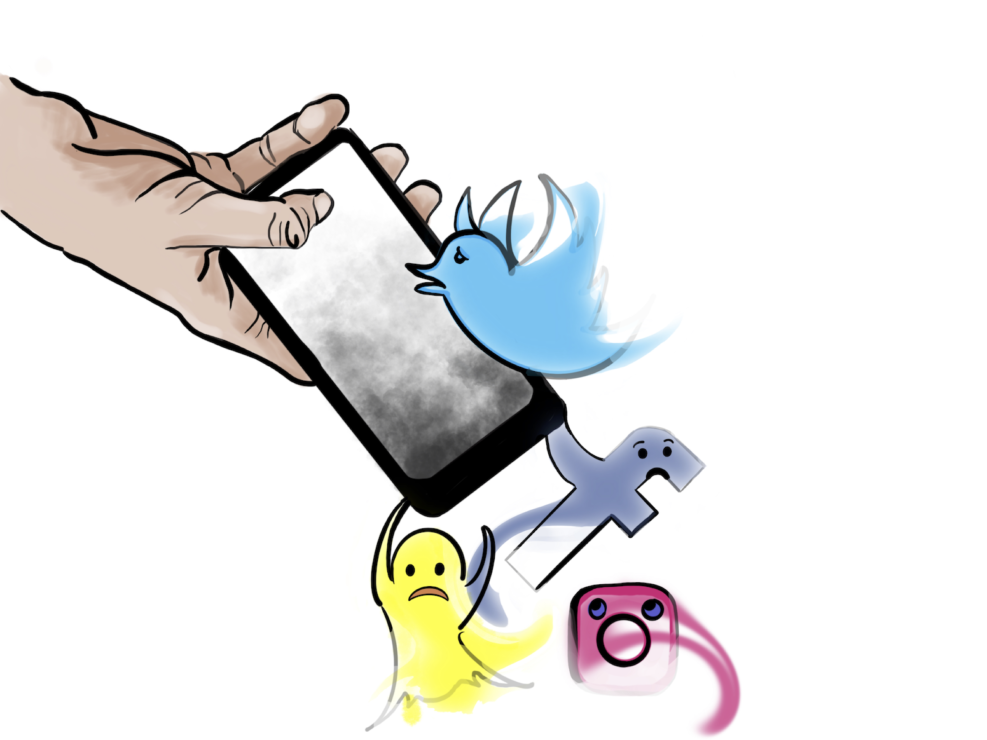Social media’s psychological and interpersonal impacts make it necessary to take time offline

What if every you time you opened Instagram, Facebook, Snapchat, or any other social media app, a message popped up asking you “Is this how you want to be spending your time?” Would it change how you use social media?
This year, I deleted all social media from my phone for a month. I realized just how much time I had been spending on Instagram, Facebook, YouTube, and other sites. I refocused my energy into interests I’m passionate about, like playing guitar and writing.
After this break, I’ve been thinking about whether the actions I’m taking are constructive and positive additions to my life. I’ve also found a few ways to manage my screen time and social media use, with my well-being and goals in mind.
Do you check social media multiple times a day and end up spending more time than intended on it? Is it hard for you to resist checking social media while in class, studying or simply watching a movie? If your use of social media disrupts your life to this extent, you may be addicted.
This doesn’t make you weak. In fact, social media companies invest lots of money and time into “persuasive design,” a methodology used to trap users in apps for as much time as possible.
The more time you spend on Facebook, for example, the more money they make and the more ads they’ll likely sell. It’s in social media companies’ best interests that you spend as much time as possible on their sites, thus they use designs and algorithms that trigger the release of dopamine through likes and comments.
The unpredictability of social media is part of what makes it so addictive. Like pulling the lever of a slot machine, we never know what we’ll see when we open our accounts. Will our post have new likes and comments? Will we have new messages? Every time we post something new, we wonder how many likes it will get. The unknown possibilities keep us coming back for more, always hoping to find intoxicating notifications flashing on our screens.
It’s time we started paying attention — not only to how much we use social media, but also to how and why we use it. When using social media, we become a spectator of other people’s lives and put on a performance of our own, whether we are aware of it or not.
Our performances on social media creates the illusion, through carefully curated images and text, that our lives are always positive and eventful. Seeing the highlight reel of other people’s lives can lead to comparison and jealousy, or FOMO, which often causes dissatisfaction in one’s life. When we only see the highlights, everyone else’s life seem perfect because we don’t see every moment, with all of the hardships and inevitable struggles.
There’s a lot to consider when using social media, but a good place to start is being conscious and deliberate with your actions. Who are you following and how do their posts make you feel? Does posting a selfie really make you feel good, or does it just give you a shallow level of validation that is dependent on others’ reactions? Could you be using social media as an unhealthy coping mechanism for something else going on in your life, such as loneliness or a mental illness?
Consider your time on social media as an investment; are these sites where you want to spend your limited time and energy? After all, when you look back on your life from the future, what will you wish you did with your time?
Here’s a few practical tips from my social media break that could benefit even those not looking to go cold turkey on social media:
- Delete the apps off your phone. You can always redownload them if you really want or need to in the future. Keep in mind, you can still access most social media websites on a computer.
- Have an idea of what kind of life you want to live and what activities you’ll engage in to replace the time you used to spend on social media. For example, if you usually check your phone every night or morning, develop a new practice. Maybe you want to start meditating, reading, or keeping a journal.
- If you’re not going to delete your apps but want to keep track of screen time, check out the app Moment, which also has a free course called “Bored and Brilliant” that gives you different challenges for each day, such as keeping your phone in your bag while traveling or taking moments to notice the world around you. Also, a lot of phones can now track your screen time — on iPhones just go to settings and click “Screen Time.”
- Turn off your notifications to give yourself more agency, so that you don’t get sucked in to scrolling through your socials without the intention of doing so.






